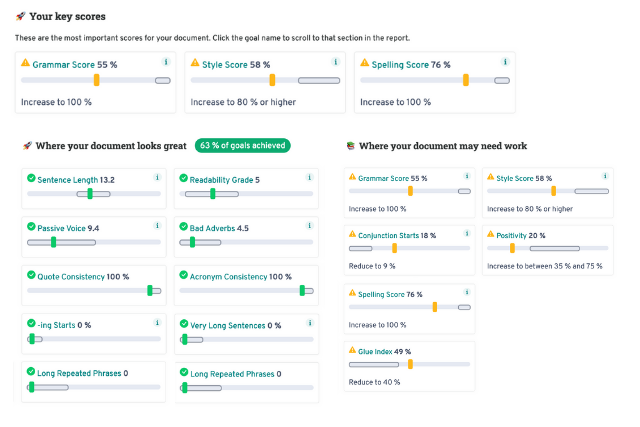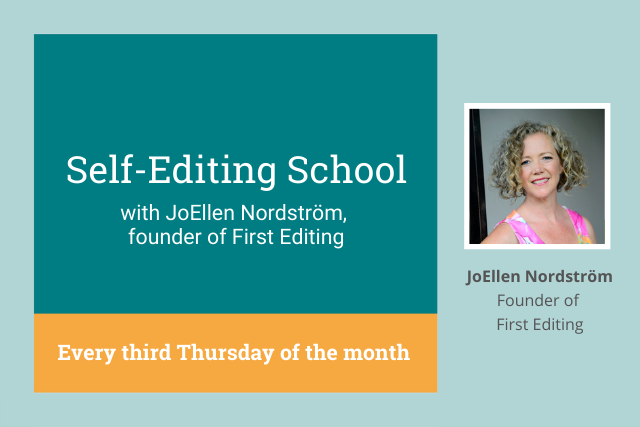Different editors work on different elements of your book. Watch JoEllen's session on the difference between copy editors and developmental editors below, then read on for more tips.
On to the article.
6 Steps to Hiring a Good Editor

Editing is the most important investment you will make in your book and writing. Sure, you will also need a good book cover and some excellent marketing and promotions to launch your manuscript. However, editing is what will ultimately determine your success as an author both now and in the future.
Why hire an editor?
Firstly, editing is an experience which will transform your writing from good to great. It prepares your book for the public and for your agent. Without it, you are risking your ultimate success due to a poor first impression. Don’t do that.
Next, editing is a process in which you develop your craft and skills as a writer. By working with a professional editor, you learn not only how to write better in the future but also how to identify and fix your weaknesses. This allows you to improve and grow as an author, and can save you time and money in your future writing projects.
Lastly, editing has many stages with various drafts and revisions. You will proceed through many rounds of corrections, clarifications, structural improvements, grammar fixes, and more. Thus, it is vital that you understand the many options, tools, and choices that you have available during your editing journey. Which editorial services you choose are largely determined by your knowledge, needs, desires, and budget.
There are many options along the publishing path, and there is no single “right way” to reach your destination. However, by determining where you are and where you want to arrive, you can better plan your voyage to publication.
Here are six key steps to hiring an editor.
Step 1: Understand the different levels of editing
There are three types of editing: content editing, line editing, and copy editing.
Content Editing
Content editing (also called structural editing or developmental editing) is ideal for your first round of revisions because your editor focuses on the overall flow of the manuscript to ensure clarity, cohesiveness, and continuity.
At this highest level, you are still working creatively to ensure you have the correct elements and structure in your outline and story arc. You will develop your plot, ideas, propositions, characters, conflict, resolution, etc. depending upon your genre. This is where you get to ask your editor questions like, “Do you like it? Is it any good? How do I make it better?” You will likely work together with your content editor on sectional rewrites, structural adjustments, fixing plot holes, etc.
Line Editing
Line editing is the level of editing most recommended by agents and professors before you submit your work for review. Your manuscript’s structural development needs to be completed before this phase.
A line edit focuses more on the accurate use of grammar, spelling, and punctuation while still ensuring that your ideas are conveyed easily. Additionally, line editors ensure consistency and flow of voice by checking correct verb tense, use of transitions, and continuity details.
Copy Editing
Copy editing is your final edit before formatting your manuscript. You should no longer have any questions regarding the details within your book. A copy edit is strictly focusing on grammar, spelling, and punctuation. It is your last line of defense and very important.
If you are unsure at any time which editing level you actually need, always start by getting a review of your writing by the editor that you are considering.
Step 2: Determine what type of editing you need
Are you still in the creative process of writing your manuscript?
You are in need of content editing. At this stage, I highly recommend that you also invest in some good self-editing tools. These make self-editing easier and more organized. Many are free or very reasonably priced. Plus, they will save you time. Of course, I highly recommend ProWritingAid.
Get a manuscript review or editorial critique.
When you feel that you have fully developed your overall structure, an editorial review points out the areas which need work and clarification.
Hire a book coach or content editor.
They will work with you personally to assist in developing your overall outline and structure while ensuring all the necessary elements for your genre are included from the beginning.
Wondering what a book coach does? Watch our webinar with Book Coach, Jennie Nash:
Do you want to share your writing publicly?
Conduct your first round of editorial services before using beta readers, seeking agents, or posting in a forum. This helps your audience read your ideas without distraction from grammar, spelling, and punctuation mistakes. Make a good first impression and build a strong reputation while preparing your manuscript.
Do you need some feedback on the overall structure?
This is a good time to seek developmental editing. A structural editor will provide you with strong feedback, recommendations, and corrections during your initial content edit.
Are you ready to clean up the manuscript in preparation for publishing?
Once you have confidently completed your first round of revisions from developmental editing, use a line editor to review your work prior to submissions to agents and publishing houses. This is very important.
Is your writing “done” and you want to format your manuscript?
Only when you are confident that you have completed all necessary revisions should you hire a copy editor. Copy editing is the final step before formatting and always necessary, especially if you are self-publishing.
Step 3: Embrace the overall editing process
There are many different phases and options when it comes to editing. Again, your needs, desires, and budget will highly influence your choices. However, you should not rush or try to find short cuts during the editing process.
Ideally, you should edit and revise as many times as you can—and then some more! The most successful authors realize that they must write, write, write, and rewrite to succeed with their vision.
Thus, it is important that you consider all the following editing stages and options:
- Writing tools, apps, and plug-ins
- Self-editing techniques and revising your writing
- Developmental editing during the creative phase
- Independent editorial reviews and writing critiques
- Professional line editing prior to sharing your writing publicly
- Feedback from beta readers
- Editor/agent help in preparation for traditional publishing
- In-house editing services provided by the publishing house
- Copy editing before formatting for self-publishing
Step 4: Create your editing budget
Editing is not cheap. Period.
You will invest both time and money when preparing your book for publication.
On the high end are book coaches who provide structural advice and the promise of presenting your book to publishing agents. Developmental editors provide intense story editing, reviews, and content editing with potential multiple rounds of revisions.
Professional editorial services include content and line editors who can correct and perfect your work while providing feedback and advice. Then you have your final line of defense during copy editing.
Copy editors provide the last edit before formatting and only focus on the grammar and spelling basics for your final polish. However, do not consider copy editing as the most affordable “solution” for your editing needs. If you need more in-depth editing, you need to ensure that you get it via content or line editing.
When choosing your editor the most important factor to consider is “What do you need?” Again, NEVER hire an editor based strictly on price if they can’t completely provide what you actually need. The old saying that “you get what you pay for” is true.
You would not take your sick baby to a part-time doctor with no experience, specialized skills, or proven abilities. It is the same for your book. You need help from an experienced and qualified expert. Otherwise, your “baby” is in danger.
There are many editing options available and it can be confusing. However, by understanding the overall editing process, you can make a better decision and plan accordingly.
Finally, remember that editing is an education which improves not only your current writing but also your future work as you learn how to identify, correct, and improve your craft.
Step 5: Prepare by self-editing first
We talk a lot about the importance of doing a very thorough self-edit before you send anything off to your editor for two reasons:
1) You need to be sure that every word is getting across your ideas exactly as you want, because no one knows your writing like you do. You need to make sure that your voice and perspective are clear. Otherwise there is a danger that an editor can edit away some of your meaning because they have misunderstood your intention.
Self-editing first also allows you to properly assess your editor's feedback accurately. The edits they suggest may not be right if your meaning and intent is unclear.
2) Your editor has limited time. You don’t want them to be fixing basic writing issues like passive voice and nominalization. Tighten it up yourself so that your editor can really focus on polishing. If you think of your manuscript as being carved out of wood, you need to be the rough sandpaper so that your editor can be the fine sandpaper.
There is a plethora of tools, plugins, and apps to help you become a better writer. By using these, you will soon learn your weaknesses, improve your writing, and eliminate paying for easy corrections from an editor which will save you money now and in the future.
There are many independent things that you can do to self-edit. Try as many different methods as possible until you find what works for you.
I encourage all writers to do at least these three things for self-editing:
1. Use tools, apps, and plugins designed for writers
Take advantage of MS Word’s spell check, Fictionary, ProWritingAid, and more.
ProWritingAid allows you to dig into the details and get a solid high-level view of your manuscript. The Summary Report gives you goals to work on, allowing you to break the self-editing process up into bite-size pieces that will make it more manageable.

2. Take a break
Walk away and recharge for a month. Let your subconscious work on the book in peace without performance pressure. Come back fresh and conduct your revision.
3. Read it aloud
Listen to your story as you read it word-for-word out loud and correct it as you go.
Step 6: Ask the right questions before hiring your editor
Each editor has a unique style and ability based upon their education, skills, background, experiences, training, and more. One of the biggest challenges to overcome when hiring an editor is to be confident in who you have chosen from the thousands of people claiming that they are qualified to assist you.
The selection process can consume a large amount of time and energy when determining who you feel safe hiring. Be sure to consider the editor’s success record, costs, availability, and satisfaction guarantee (if available at all) to decide if they are worth your investment. Take your time when deciding how to work with an editor.

Before hiring, ask the following questions:
What editing services do you provide?
Based on their skills and background, determine if they are the right fit for your specific needs, desires, and budget.
What can I expect from you?
Understand their process, communication style, pricing, limitations, delivery times, availability, and guarantees.
What do you personally recommend for my book?
Have them assess your editing needs via a full critique of the manuscript or by providing a short editing sample of your writing.
What are your references for success?
Read any testimonials and success stories that they can provide.
How long have you been in the industry?
Rely heavily on their many years of active experience and expertise.
Can you provide a sample edit of my book?
Ask for a free sample or pay for a sample first before you pay the big bucks for a full edit.
What are your fees?
Again, determine exactly what you are getting for the agreed-upon price. Make sure that you understand completely so that there are clear expectations on both sides and no surprise extra costs added.
Hiring an editor is a major decision which should not be taken lightly. You are entrusting your editor with your book and personal reputation as a writer. A successful editor can transform your writing from good to great while ensuring you are prepared for publishing.


